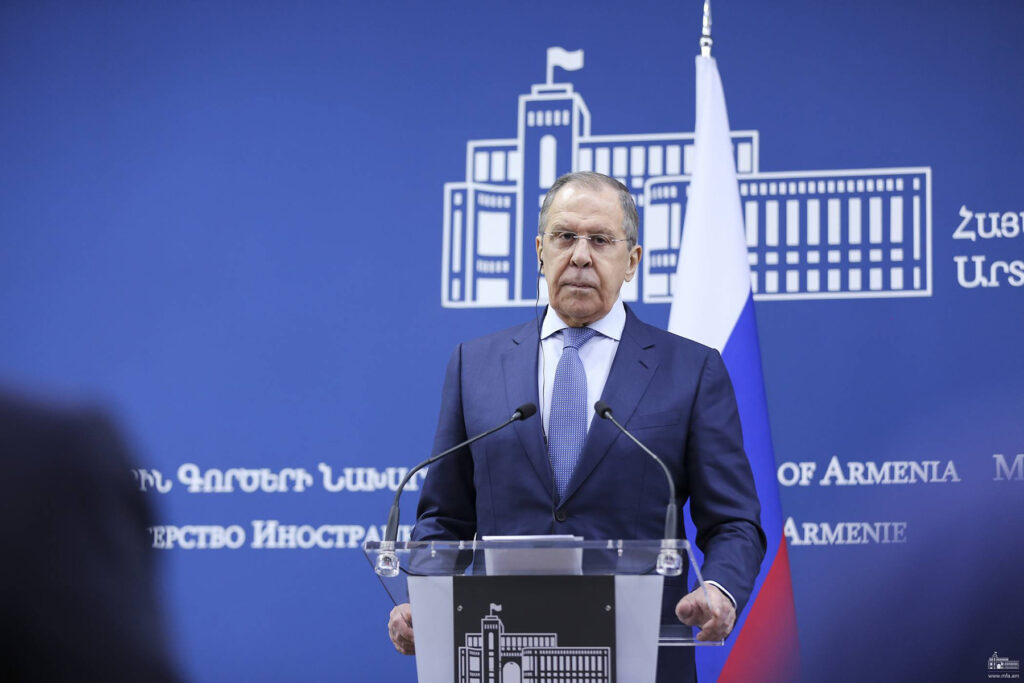After Russian Foreign Minister Sergei Lavrov said France and the United States excluded Russia from the OSCE Minsk Group, the US denied his claims while Armenian Prime Minister Nikol Pashinyan called the comments ‘strange’.
The US representatives in the Minsk Group stated on 28 June that the US and French counterparts ‘discussed the future of Nagorno-Karabakh’ though the ‘Russian Co-Chair did not accept the invitation’.
‘We look forward to the Minsk Group’s continuing work’, a tweet from the US State Department’s Bureau of European and Eurasian Affairs reads.
The controversy over the future of the Minsk Group — the main body mediating the negotiations over the Nagorno-Karabakh conflict since the 1990s — emerged after the Russian invasion of Ukraine.
In early April, Russian Foreign Minister Sergei Lavrov stated that France and the United States have tried to ‘exclude’ Russia from the Minsk Group and accused trying to ‘cancel’ everything to do with Russia.
‘If they are ready to sacrifice the interests of the settlement in Karabakh, in the South Caucasus in general, this is their choice’, the Russian Foreign Minister said during a press conference in Moscow. ‘Not only this specific issue but all the other issues are being held hostage to their Russophobic policy’.
Following Lavrov’s comments, during a visit to Yerevan, US Assistant Secretary of State Karen Donfried disputed the claim.
'Russia is a Minsk Group co-chair', she said, 'France, the US, and Russia would continue in that format.'
Lavrov, however, has remained firm and has since repeated the claim that the OSCE Minsk Group has ‘ceased its activities’.
Unlike Azerbaijani authorities, who claim that the Minsk Group proved to be ineffective in the last 30 years and that Azerbaijan has resolved the conflict through war, Armenian officials have repeated that they still hope a lasting peace deal will be accomplished with the help of the Minsk Group.
On 16 June, Azerbaijani President Ilham Aliyev echoed Lavrov’s earlier comments, stating that he had been informed that ‘the Minsk Group co-chairs will not function anymore’.
Aliyev then added that he supported the group’s dissolution, commenting: ‘it’s time for them to retire’ as Azerbaijan has already ‘settled the conflict’.
Pashinyan meanwhile, has publicly expressed incredulity at Lavrov’s comments, stating during a 27 June press conference, that he found the Russian Foreign Minister’s comments on the matter ‘strange’. The Armenian Prime Minister added that Lavrov’s statement did not correspond to a joint statement made by Pashinyan and Russian President Vladimir Putin earlier this year.
‘What is written in its 24th point [of the joint statement? It is written that we must [...] use the potential of the OSCE Minsk Group co-chairs in accordance with its international mandate’, Pashinyan said. ‘This is the official position of Russia, which is recorded on paper. I think that this contradiction should be clarified’.
Despite the apparent fallout between the co-chairs since 24 February, all three countries have remained actively involved in diplomatic efforts on the question of the Nagorno-Karabakh conflict, and have made separate visits to Armenia and Azerbaijan.




 28 June 2022
28 June 2022



